
Impact of Negative App Reviews on ASO: Robinhood Case Study
On January 28, the trading app Robinhood received over 220k negative reviews on Google Play in just one hour after it blocked the purchase of AMC and GameStop stocks.
Google removed over 100k of these reviews the following day, bringing back the app’s average star rating to nearly 4 stars. However, a second wave of over 190k new negative reviews flooded the app’s store listing again. Google stated that they would not delete these new reviews as they are compliant with Google’s policies.
Robinhood has an average rating of 1.11 for a total of 323 744 ratings on Google Play. This is the perfect example to discover how negative reviews can impact an app’s category and keyword rankings on the app stores.
Let’s take a look at the impact the recent events had on both the stores: what changed for Robinhood in terms of keyword and category rankings? Did competitors and other trading apps benefit from it?
Impact of negative app reviews on Google Play
Robinhood received a total of 226,065 1-star ratings on January 28 in the United States. The following day, 179,669 of these were deleted by Google. According to the comment posting policy, Google can delete reviews that have the intention to “mislead other users or manipulate the rating” of an app. With the first wave of reviews being considered as an organized manoeuver to harm the investing app’s reputation and rating on the store, Google actively removed most of the new ratings.
In the following two days, however, negative reviews peaked again. A total of 56,845 and 140,023 new reviews were added on January 30 and 31 respectively. So far, these reviews have not been deleted yet.

Robinhood’s number of ratings per star on Google Play in the US during the last 90 days.
As a result, Robinhood’s average rating dropped from 4.39 to 1.02. Before the events, the app had a steady 4.42 average rating for months. The removal of negative ratings by Google enabled the app to get back to an average rating of 3.40 before dropping again. Today, Robinhood’s average rating on Android is 1.12.
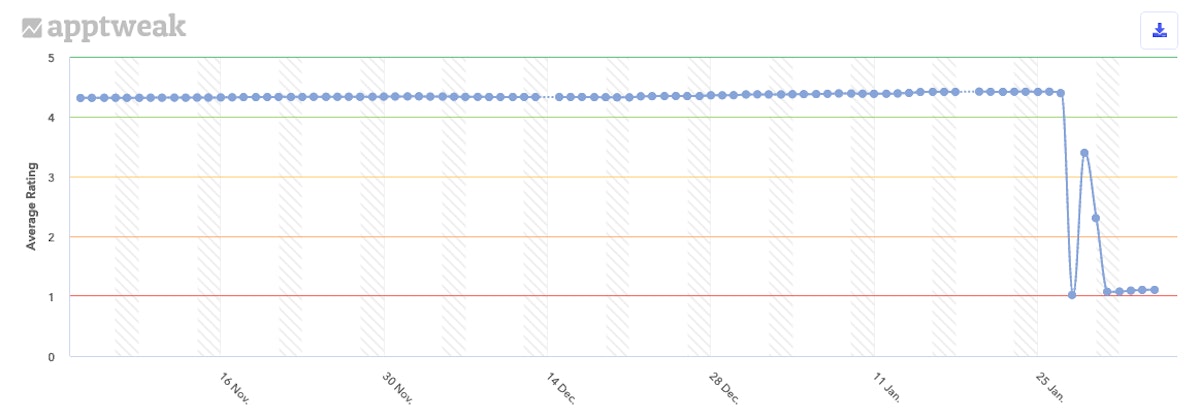 Robinhood’s average rating on Google Play (US) during the past 90 days.
Robinhood’s average rating on Google Play (US) during the past 90 days.
Robinhood’s total number of ratings and reviews skyrocketed. It had a total of 185,708 ratings the day before the backlash. After the first wave of negative ratings it reached 242,119 total ratings. The second wave brought even more ratings as there has been fewer review removals from Google’s part. The app has now a total of 332,079 on February 4th, including 94% of 1-star ratings.
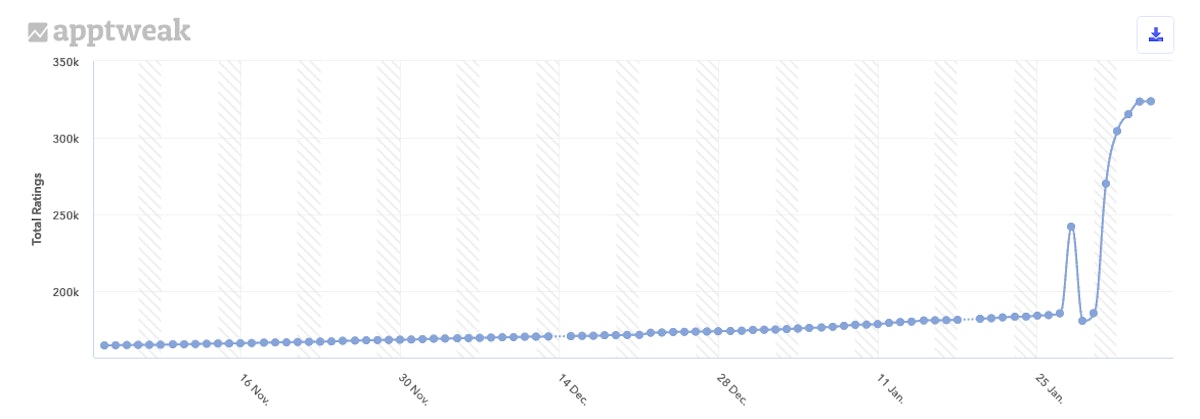 Robinhood’s total number of ratings on Google Play (US) during the past 90 days.
Robinhood’s total number of ratings on Google Play (US) during the past 90 days.
AppTweak’s Review Sentiment Analysis shows that the most negative keywords have an average rating between 1.02 and 1.1 and appear in dozens of reviews. All of them started trending very recently following the decision to block AMC and GameStop stocks.
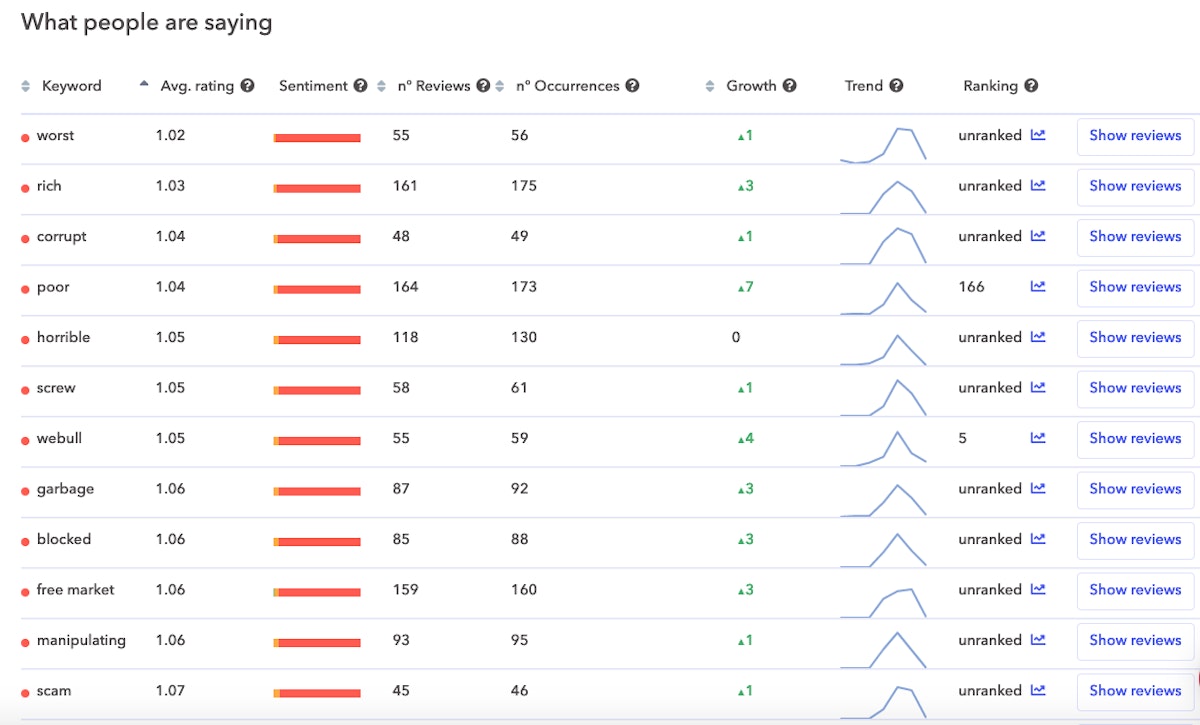 Most negative keywords used in Robinhood’s customer reviews.
Most negative keywords used in Robinhood’s customer reviews.
Impact of negative app reviews on iOS
Robinhood’s app page on iOS has been impacted also by the customer backlash.
 Robinhood’s number of ratings per star in the App Store (US) during the last 90 days.
Robinhood’s number of ratings per star in the App Store (US) during the last 90 days.
Despite the app receiving over 450k negative reviews at the end of January, the very high number of positive ratings it already had enabled the app to keep an average rating above 4. The rating did decrease from 4.72 to 4.13 from one day to another and keeps on gradually decreasing, but this is a far less grim situation than the Google Play app is experiencing.
 Robinhood’s average rating in the App Store (US) during the past 90 days.
Robinhood’s average rating in the App Store (US) during the past 90 days.
Just like on Android, the number of ratings and reviews skyrocketed, but the app already had over 2 million reviews on its app page. Still, the share of 1-star ratings grew from 3% to 22% now.

Robinhood’s total number of ratings in the App Store (US) during the past 90 days.
Impact of negative app reviews on app product page
Google Play
Robinhood’s store listing is very much impacted by these events. With an average rating of 1 star and thousands of negative reviews showing first, it is likely that their decision to halt stock trading has an impact on their app’s conversion rate, especially for users who did not follow the GameStop stock saga and are looking for the best trading app.
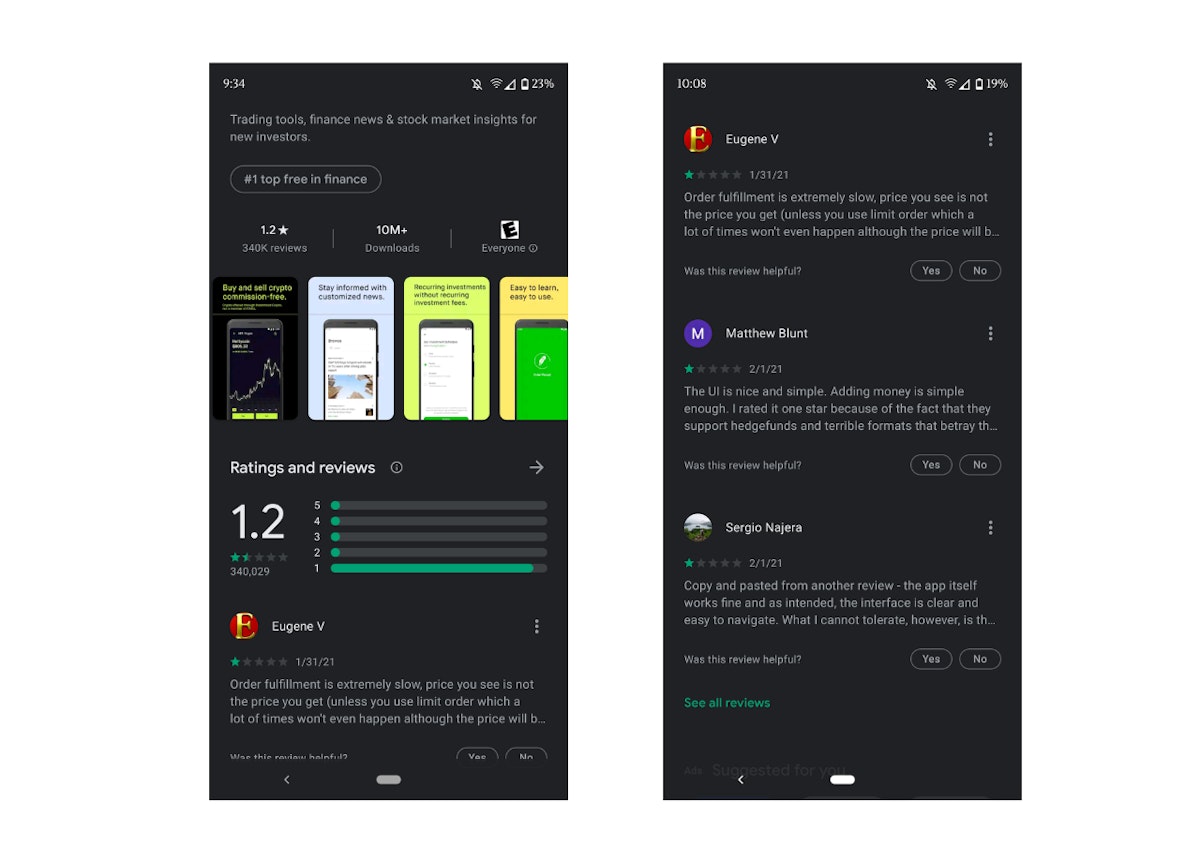 Screenshots from Robinhood’s current store listing in the US.
Screenshots from Robinhood’s current store listing in the US.
Before the backlash, Robinhood was receiving mostly 5-star reviews and the average rating had been stable above 4.40 for the past months. On January 26, two days before the first wave of negative reviews, 4- and 5-star ratings represented 87% of its total ratings and reviews.

 Robinhood’s ratings summary on Android on January 26, before the backlash, and today February 5.
Robinhood’s ratings summary on Android on January 26, before the backlash, and today February 5.
App Store
The first few reviews appearing on the Robinhood’s app’s page on the App Store are positive ones. Users must scroll down through the first 10 reviews to find 1-star reviews related to the recent affair. This is probably due to the algorithm showing the most relevant and helpful reviews first on iOS, which are upvoted by other users.
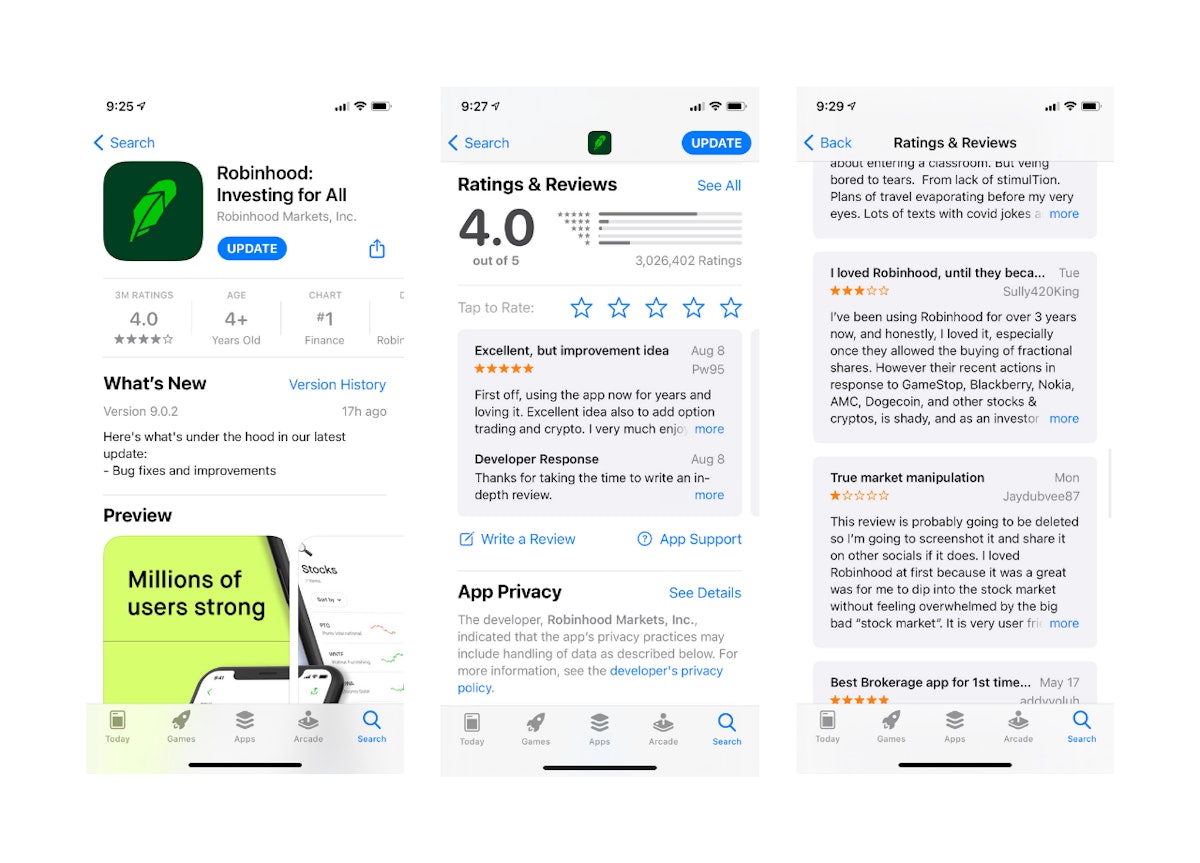 Screenshots from Robinhood’s current app page in the US.
Screenshots from Robinhood’s current app page in the US.
This, in addition to the fact that the average rating of Robinhood is still at 4 stars, makes their app page still conversion-friendly and positive.

 Robinhood’s ratings summary on iOS on January 26th, before the backlash, and today February 5th.
Robinhood’s ratings summary on iOS on January 26th, before the backlash, and today February 5th.
Read this blog to know how negative app ratings & reviews can affect your ASO
Impact of negative app reviews on category rankings
Google Play
Despite the controversies and backlash, Robinhood is facing, the app’s category rankings increased on Google Play. Not only has it been ranking #1 in the Finance category since January 28, it is also ranking #1 among all apps in the store.

 Robinhood’s ranking history on Google Play (US) in the “All” and “Finance” categories during the last 90 days.
Robinhood’s ranking history on Google Play (US) in the “All” and “Finance” categories during the last 90 days.
.png?auto=format,compress&q=75&w=1200) Top 10 in the “All” category (US) on Google Play on February 4.
Top 10 in the “All” category (US) on Google Play on February 4.
The number of visits, installs and overall activity on the app’s store listing boosted its position in the top charts. We can also see that Coinbase, another trading app, is ranking #5 in the All Category. Clearly, Robinhood is not the only trading app which experienced a boom in its category rankings following the events. This shows that an app is trending has a greater impact on the algorithm than a negative star rating.
App Store
On iOS, Robinhood’s ranking in the Finance category increased in January. It has been ranking #1 since January 27. The app ranked #1 in the All Category between January 27 and February 1, but already started to lose positions in this category.
So, even though there has been a positive impact on category rankings, it is not very likely to last in the All Category. The app was already ranking in the top 10 of the Finance category before the events, so it will most probably stay in there for a while.

 Robinhood’s ranking history on iOS (US) in the “Finance” and “All” apps categories during the last 90 days.
Robinhood’s ranking history on iOS (US) in the “Finance” and “All” apps categories during the last 90 days.
Impact of negative app reviews on keyword rankings
Generic keywords on Google Play
To assess Robinhood’s recent keyword performance, we built a keyword list of 45 generic keywords related to finance and stock markets with strong search volumes. The app is currently ranking in the top 10 for 80% of these keywords, and in the top 15 for 90% of them. Keyword rankings started increasing on the 27th and peaked on Thursday the 28th.
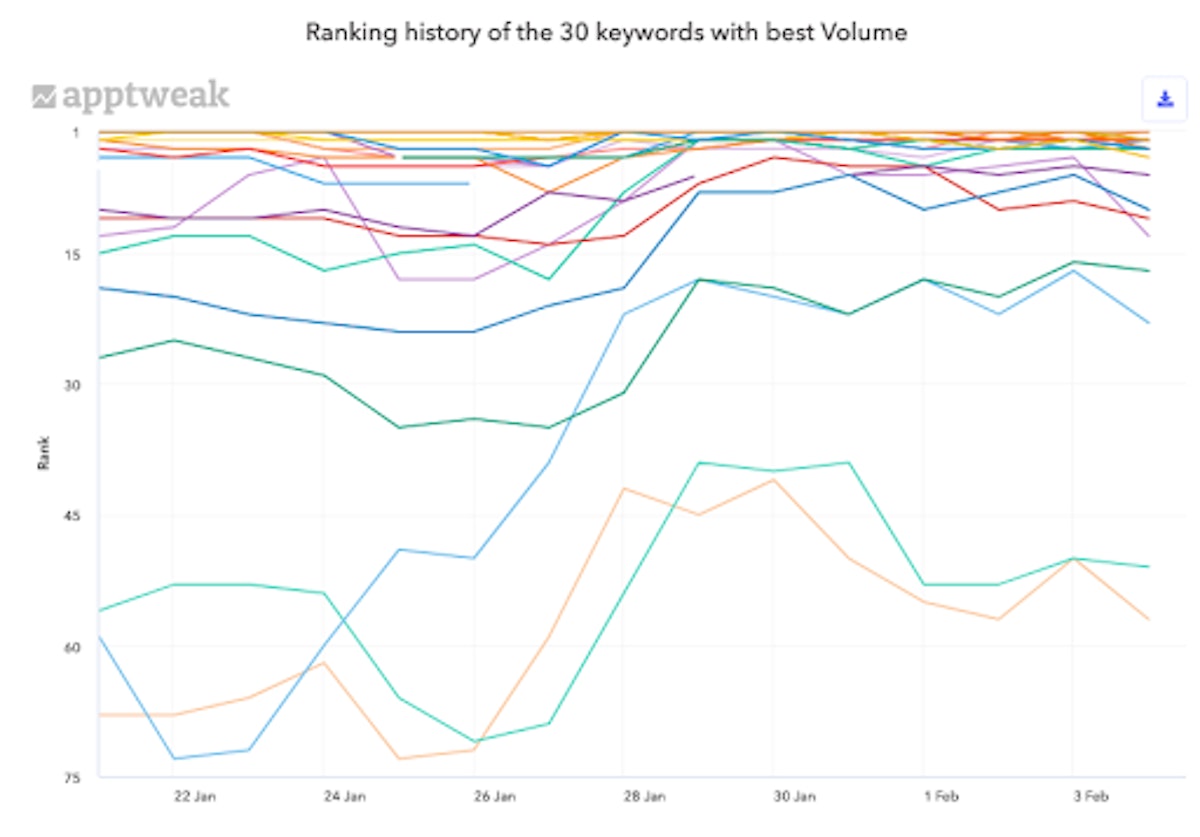
Robinhood’s ranking history on the 30 keywords with the highest search volume on Google Play (US).
When looking at the keyword impact, Robinhood had an estimated increase of 828 daily organic installs from these 45 keywords between 27 and 28 January. This is due to an improvement in rankings on important keywords such as “stock(s),” “trading,” and combinations. The biggest growth in keyword rankings is on the keyword “day trading” for which it went from unranked to ranking #4.
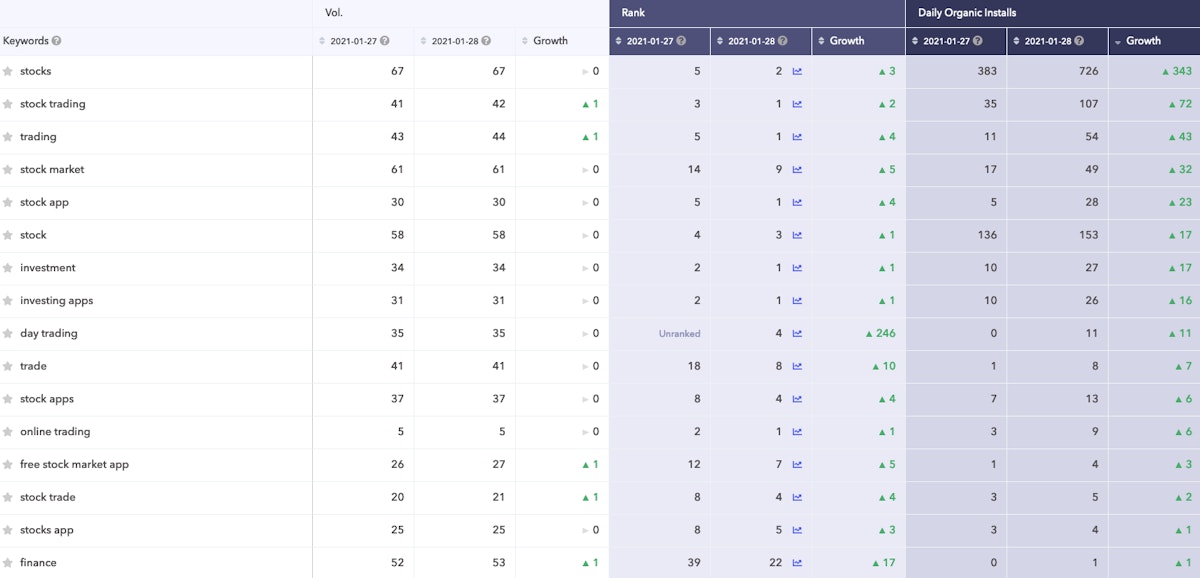 Generic keywords for which Robinhood experienced the biggest growth between January 27 and 28.
Generic keywords for which Robinhood experienced the biggest growth between January 27 and 28.
However, the effect of the outburst of visits and downloads the app has been receiving for the past week is already starting to diminish as the app is ranking lower now on a few high-volume keywords than it was on the 28th. Once the media storm is over, time will tell how these negative ratings and reviews really impact the apps’ keyword rankings.
Branded keywords
Robinhood’s ranking on competitors’ brand names has also been impacted by the recent events. The app was already ranking quite high on competitors’ branded keywords so the change is less noticeable, but it did gain a few ranks more.
.png?auto=format,compress&q=75&w=1200) Robinhood’s ranking history on competitors’ brand names on Google Play in the US.
Robinhood’s ranking history on competitors’ brand names on Google Play in the US.
Generic keywords on the App Store
We also built a keyword list of around 50 relevant generic keywords on iOS and looked at Robinhood’s ranking performance on them in the last few days. The app ranks in the top 10 for 88% of keywords in the list and is only unranked for the keywords “day trading” and “investors.”
The impact on keywords ranking is not as strong as on Google Play, but the app is estimated to have received more than 200 new daily organic installs between the 26th and the 28th from these keywords. The keyword impact shows that the app started to rank in the top 5 for a lot of high-volume keywords. The biggest growth downloads is estimated to come from “stock trading.”
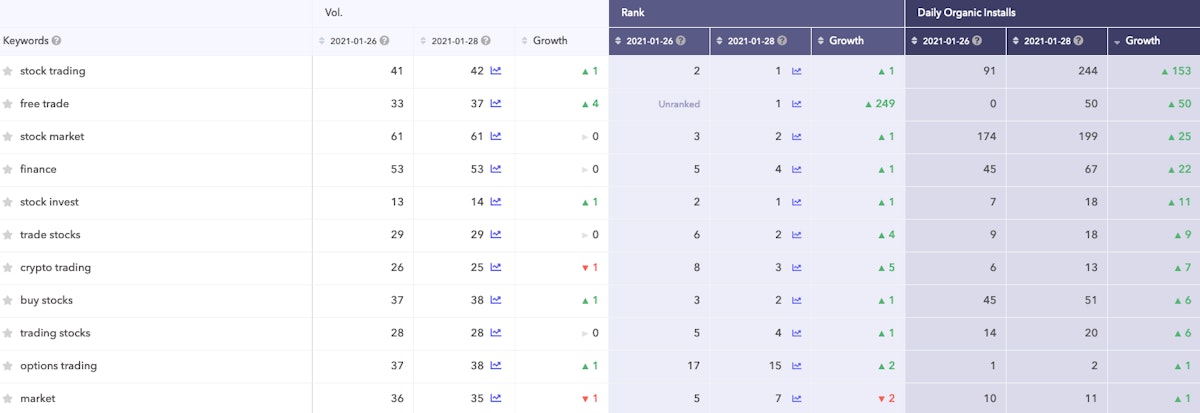 Generic keywords for which Robinhood experienced the biggest growth between January 26th and 28th.
Generic keywords for which Robinhood experienced the biggest growth between January 26th and 28th.
Branded keywords
Robinhood’s ranking on competitors’ brand names did not increase that much with the recent events. The app did gain installs by ranking higher on competitor brand names “trading view” and “e-trade.”
 Brand names for which Robinhood experienced the biggest growth between January 26th and 28th.
Brand names for which Robinhood experienced the biggest growth between January 26th and 28th.
Keep in mind these best practices when replying to app store reviews
Impact of negative app reviews on competitor apps
Google Play category rankings
Robinhood is currently still ranking #1 in the Finance and All categories. However, most direct competitors experienced an increase in their category rankings as well. Overall, trading apps gained visibility from the Gamestop affair and saw their rankings in the Finance category rise after the 28th.
Some apps started to rank in the All Category between January 27th and 30th: Fidelity Investments, TD Ameritrade Mobile, Public, E-Trade, Investing.com, and Acorns. Robinhood and Coinbase, which were already the most powerful trading apps before the events, are the ones ranking the highest today.
Learn how you can monitor your app reviews and compare your results with competitors on AppTweak

 Category rankings of trading apps in the “Finance” and “All” apps categories on Google Play in the US during the last 30 days.
Category rankings of trading apps in the “Finance” and “All” apps categories on Google Play in the US during the last 30 days.
On the other hand, other popular finance apps not related to trading, like Google Pay, Paypal, or Cash App lost positions in the Finance category.
 Category rankings of popular non-trading apps in the Finance Category on Google Play in the US during the last 30 days.
Category rankings of popular non-trading apps in the Finance Category on Google Play in the US during the last 30 days.
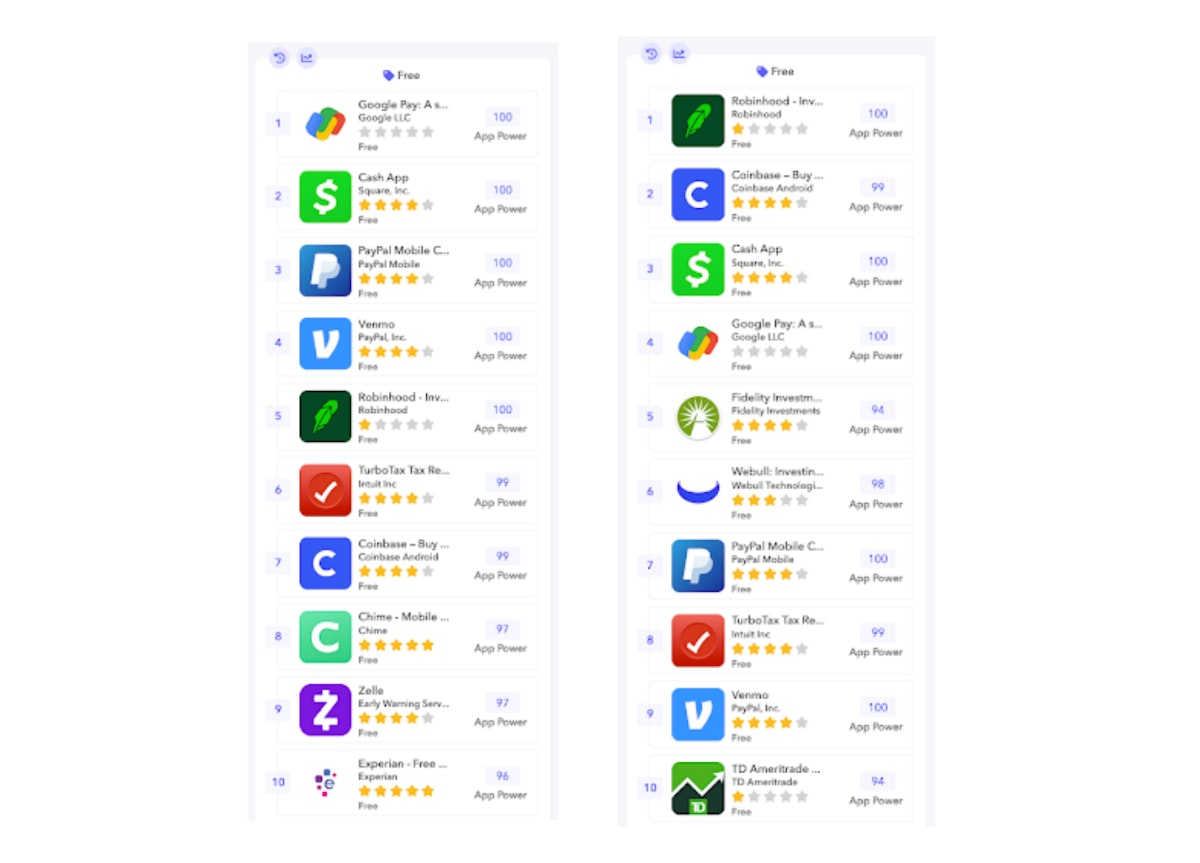 Top charts in the Finance category on Google Play in the US on January 26 (left) and February 4 (right).
Top charts in the Finance category on Google Play in the US on January 26 (left) and February 4 (right).
Ratings and reviews
Even though it is at the center of the controversies and discussions, Robinhood is not the only investing app that experienced customer backlash during the Gamestop affair. Webull, TD Ameritrade, Coinbase, Acorns, and Investing.com all received an unusually high level of negative ratings and reviews between January 27 and 29.
TD Ameritrade has been severely impacted as it did not have a lot of reviews before the events. The app’s average rating which was around 3.04 dropped on the 28th to 1.13. Webull also experienced a strong decrease in its average rating, going from 4.49 to 2.77 today, despite having more than 30k 5-star ratings.
 TD Ameritrade’s average rating in the US over the last 30 days.
TD Ameritrade’s average rating in the US over the last 30 days.
 Webull’s average rating in the US over the last 30 days.
Webull’s average rating in the US over the last 30 days.
Keyword rankings
Coinbase is the other app that seems to have benefitted from these events the most in terms of keyword ranking. The app was impacted less by the negative reviews it received thanks to the initial high number of positive ratings.
The app started ranking in the top 3 for more or less the same high-volume keywords Robinhood started ranking #1 on. Coinbase received an estimated 500 additional daily installs thanks to ranking #2 on the keyword “stocks” right behind Robinhood.
App Store category rankings
On iOS too, trading apps, in general, gained visibility from the GameStop stocks issue. When looking at the ranking history of Robinhood’s direct competitors, we can see an increase in their position. The rise is also noticeable in the All category since a few apps like Tradingview and Stocktwits started ranking on the 26th and 27th.


Category rankings of trading apps in the Finance and All apps categories on the Apple store in the US during the last 30 days.
On the other hand, other popular apps in the Finance category were negatively impacted like on Google Play. However, their decrease in ranking in the category is not likely to last as they already gained back some of the ranks they had lost on January 28th.

Category rankings of popular non-trading apps in the Finance Category on the App Store in the US during the last 30 days.
Ratings and reviews
Robinhood’s competitors were less impacted on iOS than on Android. Some of them received several hundreds of negative reviews like Stash, E-Trade and TD Ameritrade. The figures on iOS remain much lower than on Google Play where most of the backlash happened.
Fidelity Investments received over 7,000 5-star reviews during the same period and benefitted the most from the situation. As trading apps started trending more, a lot of them received new users, but it is the only app that received so much positive reviews during the GameStop stock affair.
 Fidelity Investments’ new ratings per star on iOS in the US during the last 30 days.
Fidelity Investments’ new ratings per star on iOS in the US during the last 30 days.
Keyword rankings
The competitor which benefitted the most from the trading app’s trend in terms of generic keyword ranking on iOS is also Coinbase. Between January 26th and the 29th gained more than 750 organic downloads from the selected keyword list, mostly thanks to the fact that it started ranking #1 on the keyword “crypto.”

Generic keywords on which Coinbase experienced the biggest growth.
Deep dive into tools & techniques for review management in AppTweak
Review Management with GPT-4
Centralize all your app store reviews & increase efficiency with GPT-4 reply suggestions, templates, Zendesk integrations, and more.
Conclusion
App reviews and ratings are very important conversion incentives and help a user decide whether or not they want to download an app. In that sense, Robinhood’s reputation and conversion power have been impacted strongly, particularly on the Play Store.
This study case showed that a trending app, even if it is in a negative way, can receive a boost in keyword and category rankings on both stores. This being said, the effect the GameStop issue had on Robinhood’s rankings is most probably not going to last when the trend is going to cool down, particularly on Android. We will definitely keep an eye on keyword rankings to see how an influx of negative reviews impacts keyword rankings in the long run.
Finally, the Robinhood case made people question the role Apple and Google must play in such situations – should Google have removed almost all of the negative reviews that had been posted?



 Oriane Ineza
Oriane Ineza


 Natalia Kryukova
Natalia Kryukova